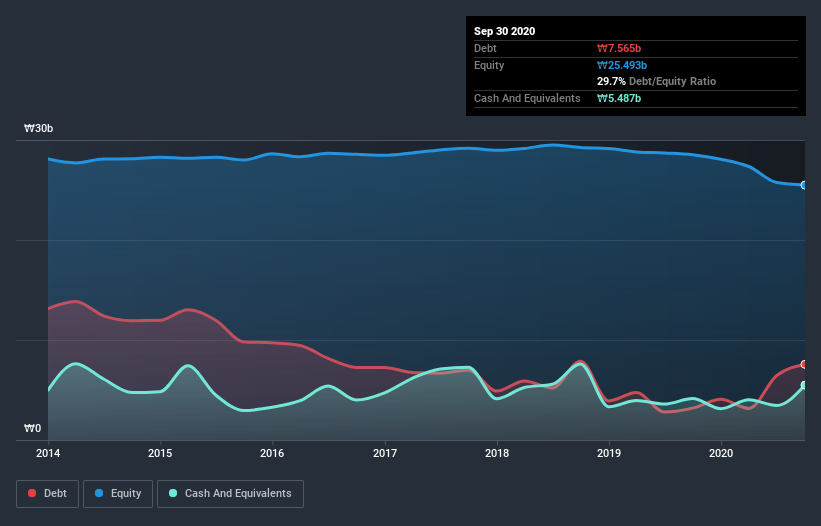- South Korea
- /
- Metals and Mining
- /
- KOSDAQ:A026910
Kwang Jin Ind (KOSDAQ:026910) Is Carrying A Fair Bit Of Debt
Warren Buffett famously said, 'Volatility is far from synonymous with risk.' So it seems the smart money knows that debt - which is usually involved in bankruptcies - is a very important factor, when you assess how risky a company is. We can see that Kwang Jin Ind. Co., Ltd. (KOSDAQ:026910) does use debt in its business. But the more important question is: how much risk is that debt creating?
What Risk Does Debt Bring?
Debt and other liabilities become risky for a business when it cannot easily fulfill those obligations, either with free cash flow or by raising capital at an attractive price. Part and parcel of capitalism is the process of 'creative destruction' where failed businesses are mercilessly liquidated by their bankers. However, a more common (but still painful) scenario is that it has to raise new equity capital at a low price, thus permanently diluting shareholders. Of course, debt can be an important tool in businesses, particularly capital heavy businesses. The first step when considering a company's debt levels is to consider its cash and debt together.
View our latest analysis for Kwang Jin Ind
What Is Kwang Jin Ind's Net Debt?
As you can see below, at the end of September 2020, Kwang Jin Ind had ₩7.56b of debt, up from ₩3.19b a year ago. Click the image for more detail. However, it also had ₩5.49b in cash, and so its net debt is ₩2.08b.

How Healthy Is Kwang Jin Ind's Balance Sheet?
According to the last reported balance sheet, Kwang Jin Ind had liabilities of ₩8.59b due within 12 months, and liabilities of ₩3.52b due beyond 12 months. On the other hand, it had cash of ₩5.49b and ₩4.00b worth of receivables due within a year. So it has liabilities totalling ₩2.63b more than its cash and near-term receivables, combined.
Since publicly traded Kwang Jin Ind shares are worth a total of ₩22.6b, it seems unlikely that this level of liabilities would be a major threat. Having said that, it's clear that we should continue to monitor its balance sheet, lest it change for the worse. When analysing debt levels, the balance sheet is the obvious place to start. But it is Kwang Jin Ind's earnings that will influence how the balance sheet holds up in the future. So when considering debt, it's definitely worth looking at the earnings trend. Click here for an interactive snapshot.
Over 12 months, Kwang Jin Ind made a loss at the EBIT level, and saw its revenue drop to ₩42b, which is a fall of 4.7%. We would much prefer see growth.
Caveat Emptor
Over the last twelve months Kwang Jin Ind produced an earnings before interest and tax (EBIT) loss. Its EBIT loss was a whopping ₩2.6b. When we look at that and recall the liabilities on its balance sheet, relative to cash, it seems unwise to us for the company to have any debt. Quite frankly we think the balance sheet is far from match-fit, although it could be improved with time. However, it doesn't help that it burned through ₩2.7b of cash over the last year. So suffice it to say we consider the stock very risky. There's no doubt that we learn most about debt from the balance sheet. But ultimately, every company can contain risks that exist outside of the balance sheet. To that end, you should learn about the 2 warning signs we've spotted with Kwang Jin Ind (including 1 which is is a bit unpleasant) .
At the end of the day, it's often better to focus on companies that are free from net debt. You can access our special list of such companies (all with a track record of profit growth). It's free.
If you decide to trade Kwang Jin Ind, use the lowest-cost* platform that is rated #1 Overall by Barron’s, Interactive Brokers. Trade stocks, options, futures, forex, bonds and funds on 135 markets, all from a single integrated account. Promoted
Valuation is complex, but we're here to simplify it.
Discover if Kwang Jin Ind might be undervalued or overvalued with our detailed analysis, featuring fair value estimates, potential risks, dividends, insider trades, and its financial condition.
Access Free AnalysisThis article by Simply Wall St is general in nature. It does not constitute a recommendation to buy or sell any stock, and does not take account of your objectives, or your financial situation. We aim to bring you long-term focused analysis driven by fundamental data. Note that our analysis may not factor in the latest price-sensitive company announcements or qualitative material. Simply Wall St has no position in any stocks mentioned.
*Interactive Brokers Rated Lowest Cost Broker by StockBrokers.com Annual Online Review 2020
Have feedback on this article? Concerned about the content? Get in touch with us directly. Alternatively, email editorial-team@simplywallst.com.
About KOSDAQ:A026910
Kwang Jin Ind
Manufactures and sells hot rolled, cold drawn, and peeled steel bars in South Korea.
Acceptable track record and slightly overvalued.
Market Insights
Community Narratives




